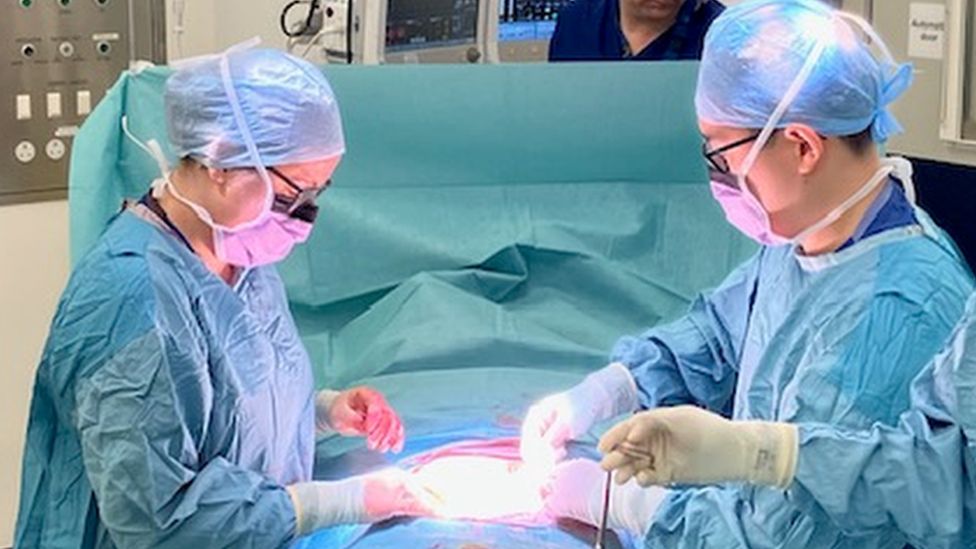Bowel cancer patients allowed home on same day as stoma surgery
- Published

Patients in Somerset are the first in England to be allowed to go home on the same day as having major surgery to remove a stoma bag.
This means they are able to start going to the toilet again much sooner, rather than having to empty their stoma bags.
Dennis Upshall, 73, is the fifth patient to benefit from the change.
A nurse said the scheme allowed for a quicker healing process and low infection risk.
Earlier this year, Mr Upshall had cancer removed from his bowel. Patients like him would normally have a stoma bag fitted as a temporary measure.
Several weeks later they would need an ileostomy closure, which is surgery to reverse a stoma bag and restore the normal passage of stool from the small bowel to the rectum.
In this operation, the surgeon makes a cut around the ileostomy, frees up the loops of small bowel, and joins the two ends back together.
The surgery is usually done through the stoma, but sometimes an additional incision is needed. Patients normally then have to wait in hospital for up to seven days before being allowed to go home.
Mr Upshall had been unable to go to the toilet normally for several months - relying instead on a stoma bag while his bowel healed.
But under the new procedure, he was able to be discharged to his home in Street on the same day of his bag removal operation, and is now under the clinical supervision of a new 'Hospital at Home Scheme'.
It allows patients like him to take blood pressure and oxygen levels which are then monitored remotely by an intermediate care clinician - nurse Claire Coleman.
The technology looks out for deterioration in blood pressure and increases in heart rate.
She said: "It means that the patients can come out of hospital a little bit earlier. They are not bed-blocking and they can be monitored in their own home.
"[It is a] much nicer environment. The healing process is a lot quicker and there is low infection risk."
Mr Upshall said what he went through was a much more preferable process to what had been done previously.
"It's so much better for people to be able to come home in their own environment and feel relaxed about it all and it's not difficult to use," he said.
"It's all self-explanatory and they give you a test run before you need to use it [the monitoring equipment]," he added.
Gemma Briggs, matron of theatres at Somerset NHS Foundation Trust, said: "Patients like Dennis have a bag because their bowels need to heal so all of their faeces will be going into a bag."
Patients can wait up to two years to have the bag removed, which "is a considerable length of times for them to manage those bags and have a visual reminder of their cancer journey," she added.
Since this scheme was introduced in July, the hospital trust says it has already had a remarkable effect, with waiting times down from more than two years to just a few months.
The trust now hopes the Hospital at Home Scheme can be used for patients with other conditions to give them the best chance of healing at home.
Follow BBC West on Facebook, X and Instagram. Send your story ideas to: bristol@bbc.co.uk
Related Topics
- Published18 August 2023
- Published27 June 2023
- Published21 June 2023